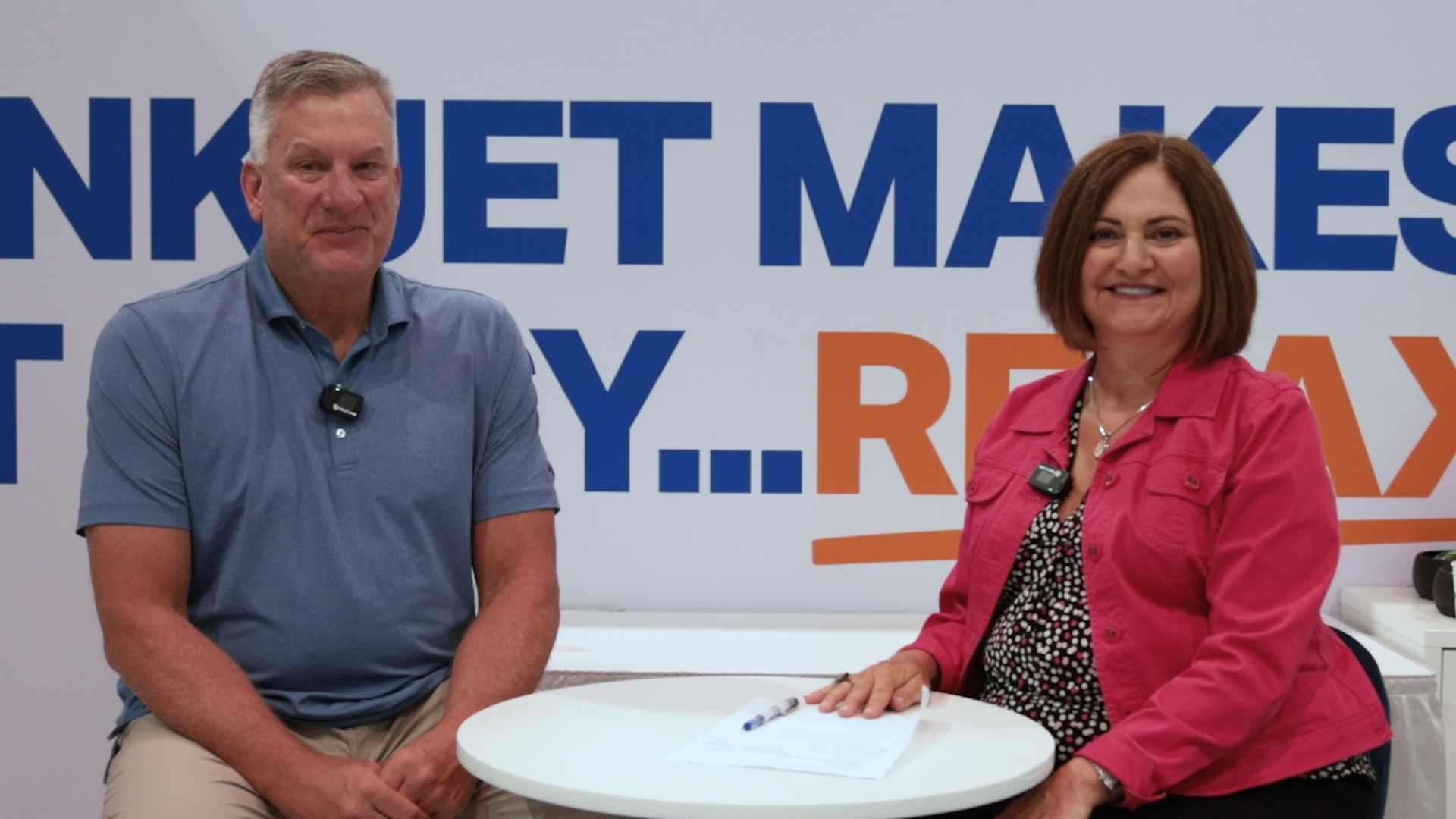Commentary & Analysis
Displaying 5701-5800 of thousands of articles
Insight You Need. Analysis You Trust.
Get the trusted insights you need to understand our evolving industry and emerging trends. Become a Premium Member.
Looking Back on Graph Expo 2011
Graph Expo is an important event to our industry. In the last few years the show has evolved to address industry changes and economic conditions. Today Graph Expo is more valuable than ever as a place to interact with peers and determine where our industry is headed.
Drupa 2012, the Inkjet Drupa…again?
This new series by David L. Zwang will focus on current production inkjet products and their application in the market today. This series will run every 3 weeks leading up to Drupa 2012. He will look at the current vendor product offerings, and how they are being used by some of their showcase customers. In this first article of the series, David discusses some background on drivers and obstacles to mainstream adoption to production inkjet.
Promising to Protect Customers, Kodak and Collins Ink Corp. Part Ways
With each vowing that customers won’t be harmed as a result of their estrangement, Kodak and Collins Ink Corporation have come to the abrupt end of a 10-year deal whereby the latter supplied the former with inkjet inks for Versamark digital presses.
Have We Crossed the Chasm for Cross-Media Marketing Services?
In the 1991 book entitled Crossing the Chasm, Geoffrey Moore creates a revised adoption life cycle for technologies consisting of Technology Enthusiasts, Visionaries, Pragmatists, Conservatives, and Skeptics. Moore identifies some key steps for successfully crossing the chasm in the high-tech market, and successful cross-media service providers are following some of these very steps to increase their profitability. This document outlines Moore’s suggestions for success and explains how they apply to the cross-media market.
Kodak President & COO Phil Faraci Clarifies Kodak Position
Recent news stories about Kodak have implied that the company’s digital transition is not going as planned, even suggesting an investigation into filing bankruptcy. While waiting for Kodak to announce quarterly earnings on November 3rd, WhatTheyThink spoke with President & COO Phil Faraci to gain his perspective these issues.
TRI-C Enterprises CEO and PIAG Chairman Bill Cole Talks About Turning His Business Around
Bill Cole, CEO of TRI-C Enterprises and PIAG Chairman, talks with Senior Editor Cary Sherburne about the impact last year’s PIAG book study group, featuring Disrupting the Future by Dr. Joe Webb, had on the future of his business…a wake-up call that infused new energy and excitement into his life and his business.
Pouring Another "Cup O Joe": Lenders Talk About Lending (Part 2)
As everyone knows, the recession has made business financing hard to come by. In this two-part “Cup O Joe,” lenders to the printing industry report that loan products are available and discuss how printers can obtain them.
Are You a Problem-Solver or a Supplier
Service providers need to know how to differentiate themselves in the eyes of marketing executives. This article provides expert feedback on how service providers can become more innovative in their selling practices to create more value and build stronger business relationships.
Delivering Value via the Web
Although most of us understand that electronic communications are here to stay, it can still be difficult to figure out how best to leverage it in a business sense. WhatTheyThink spoke with Mohawk’s Chris Harrold, VP, Business Development, about the company’s new service platform for digital printers, Mohawk MakeReady, a great example of using the Web to deliver valuable information while building increased credibility for the business.
Owning The Cloud
Andy takes a look as HP switches to move further into being a software and services company with an emphasis on Cloud based operations.
Digital Technologies Help Packaging Prepare for a Faster Future
Modern marketing means brand extensions, on pack promotions, packaging to tie in with events – all designed to increase sales and enhance relationships with consumers. This provides opportunities to printers that can meet these demands
Low Prices, New Features Mark New Crop of Kindle Devices from Amazon
This week, Amazon unveiled four aggressively priced content delivery devices: one, a multimedia tablet aimed squarely at Apple's market-dominating iPad; the other three, the latest iterations of Amazon's popular Kindle e-reader.
Production Automation: How Do You Get Started Affordably?
Following up on her recent article, Graph Expo Retrospective, Senior Editor Cary Sherburne takes a look at production automation, a key "Critical Technology" as identified by the Graph Expo Must See 'ems committee. Getting started might be more affordable than you think.
A New Vernacular: From Web-to-Print to Marketing Supply Chain Optimization
Oversights in the marketing supply chain are resulting in overspending and missed opportunities for making a real impact on the sales and demand process. While the economy is improving and marketing personnel are beginning to reinvest in demand generating programs, marketers are not in a position to ignore the waste that is being created by an unchecked and unmeasured marketing supply chain. This article outlines the components involved in delivering an optimized supply chain.
"Too Good" Was (Almost) the Phrase for Print Production Technologies at Graph Expo (Part 2)
Whatever may be happening to the demand for print, Graph Expo 2011 made one thing abundantly clear: never before have printers had as many options as they now possess for adding beauty, charisma, and value to a piece of paper.
Graph Expo Retrospective; Critical and Opportunistic Technologies for Future Success
As the industry gets back to work following a busy Graph Expo 2011, it is a good time to take a look at some of the technologies that were on display-both those that are critical to the short- and long-term profitability and survival of a printing company, and opportunistic technologies that can provide differentiation.
Hunker Down Financially, Market Aggressively
Dr. Joe explains the bearish outlook for the economy but explains how the advertising agency business has been rising and adding employees. It's important to know who your competitors are, especially in terms of an overlooked factor in decision making, the cost of failure, which sometimes trumps common sense.
Dumping Your Printer is Madness
The New York Times published an article titled "Dump Your Printer To Escape the Madness." The author, Sam Grobart, launched an attack on the "printer-industrial complex" but by the third line stated that "we live in a world where going without a printer can be more trouble than it is worth." Charlie Corr examines the facts.
"Too Good" Was (Almost) the Phrase for Print Production Technologies at Graph Expo (Part 1)
Whatever may be happening to the demand for print, Graph Expo 2011 made one thing abundantly clear: never before have printers had as many options as they now possess for adding beauty, charisma, and value to a piece of paper.
Do You Have a Mobile-to-Print Strategy Yet? It's Time!
Much like creating a Web-to-print site became integral for profitable service providers in the past, offering a mobile-to-print site will quickly become a necessity in the market of the future. Service providers will need to recognize the importance of design and usability between traditional and mobile sites. This article provides examples of Graph Expo vendors that are working to implement mobile-to-print solutions.
Is Waterless the Future of Printing (by Inkjet)?
Andy examines waterless inkjet printing by visiting the first US installation of the Xerox CiPress 500 at dmh Marketing Partners in Mt. Pleasant, Iowa.
A Few Trends that Got Us to Where We Are
Printers are providing more value-added services that go beyond paper. They are evolving into new kinds of companies. Here are some of the steps that got us to this point.
The Cross-Media Buzz at Graph Expo 2011
At Graph Expo 2011, software solutions were at top-of-mind for many of the printers participating in the show. Early adopters of variable data and cross-media solutions typically developed "home-grown" systems internally because the available solutions were limited, but this has changed. This article provides examples of two service providers who initially built their own solutions, but ultimately decided that a partner could enable them to focus on their core competencies.
Océ Brings Back Technology for Its New Press Range
Every so often a new technology arrives that may have an impact on changing a market or replacing an earlier technology. Andy Tribute attends a new product launch from Océ and Canon at which they announced a new "breakthrough" technology for digital printing.
Whole is Greater than Sum of Parts in KBA-Donnelley, Xanté-Memjet Joint Ventures Announced At Graph Expo
"Convergence" in the graphic communications industry can mean many things, but at Graph Expo, it describes what happens when vendors pool their R&D resources to create production solutions more formidable than anything they could have devised by themselves.
Remarks by Heidelberg Chairman Provide Appropriate Context for Opening of Graph Expo
Opening-day remarks at Graph Expo by Bernhard Schreier captured the tone of the event and offered a restrained but still optimistic outlook for global print markets.
Ideas that Work for the Education Market
Is the Education Market one of your target markets? If you are planning on selling marketing solutions to the Education Market then you need to have a good understanding of the key challenges for this market.
Agfa and Pitman: One Year Later
In July of 2010, Agfa acquired the assets of the Harold M. Pitman Company. It's been just over a year, and WhatTheyThink takes an exclusive look at the status of the integration.
Three-dimensional Mailers…Gifts that Deliver Response Rates for Marketers
Three-dimensional mail cuts through the clutter to get important messages out to clients and prospects. Although the cost to produce a dimensional mailer is more expensive than standard direct mail, the uniqueness of the mail item gets results that outweigh the costs of production and die-cutting. We explore this concept by looking at the dimensional mail marketing campaigns of Structural Graphics.
Ricoh and Zumbox Join Forces to Simplify Digital Mailbox Solutions for Billers
Yesterday, Ricoh and Zumbox announced an alliance under which mailers can opt to provide their customers mail via Zumbox, the world's first digital postal mail system. WhatTheyThink spoke with Ricoh's Don Dew to get the inside scoop.
Pro-Sourcing, Part 2: Get Marketing, IT, Design, Social Media and Writing Projects Done for Amazingly Affordable Prices.
In part one of this article, we provided the background and the detail of what makes Pro-Sourcing an extraordinary strategy to get project work done and to extend your company's capabilities. Read on for a quick review and some useful techniques for getting Pro-Sourcing projects completed efficiently, reliably and successfully.
Redesign Your Website, Create a New Sales Tool, Update Your Company Graphics…all for under $1,000. Really!
The statement in the headline is true. All the work described above was done, the money paid. Welcome to the world of “Pro-Sourcing”. Now you can complete projects of all kinds, including marketing projects, design, IT or writing projects. Professionally. Inexpensively. Reliably. Quickly.
More on the Digital Mail Revolution, Pitney Bowes' John Schloff Provides Volly Update
Following our recent article on the latest news from Zumbox, a player in the digital mail space, we contacted Pitney Bowes' John Schloff to find out the latest about its digital mailbox offering, Volly. Schloff shares an update, including insight into strategy and plans.
The Digital Postal Mail Revolution, Will it Speed the Demise of the U. S. Postal Service?
For almost a decade, pundits have been projecting that paper mail, especially transactional mail, will be displaced by electronic alternatives. Just like the paperless office, it hasn't happened yet. But there's a lot happening in the digital postal mail realm that could change the picture entirely. John Payne of Zumbox talks about what's ahead.
RPI's Bellamy Comments on Acquisition of Netherlands-based Paro Group BV
On August 25th, Seattle-based RPI announced the acquisition of Paro Group BV, based in Eindhoven, Netherlands. The entity in the Netherlands will be known as RPI-Paro to capitalize on Paro branding there. WhatTheyThink spoke with Rick Bellamy, CEO of RPI, and Jan-Paul van den Hurk, owner and CEO of Paro Printing, for more details.
Models for Change Part 2
In part two I look at how manroland and xpedx are working to increase revenues and better position themselves for the future. The ideas of expanding product lines and forming strategic alliance are both reviewed, along with ways to bring new products and services to market.
The Four "P"s of Cross-Media Selling
Selling a cross-media solution in today's market requires four critical attributes, namely Proactivity, Proficiency, Patience, and Performance. This article cites recent research from InfoTrends to outline the four "P"s of a successful cross-media sales approach.
Exploring Mobile Marketing Opportunities Beyond the Barcode
Mobile barcodes are a hot topic in the world of marketing and advertising, and printers have latched onto this technology to add interactivity and value to print media. While barcodes are certainly relevant, there are other mobile marketing services that need to be explored, as they represent a huge untapped opportunity by many service providers.
Recession? Sure Feels Like One
Dr. Joe explains that another recession may have already started, and the thought of that may be all that's needed to create demands for more Fed easing and more fiscal stimulus. The NASDAQ is down -18% from the start of the December 2007 recession on an inflation-adjusted basis. The commodities and consumer inflation trends may actually be slowing right now. Yet again, Dr. Joe explains some of the economic workings that are contrary to the morning news.
Quark Moves On
It was announced last week that Platinum Equity had acquired Quark Software Inc. Without an understanding of the digital media market over the past thirty years this may seem just like another investment by a financial investment company. For those of us who have been involved in the major changes that have happened, to us Quark is one of the key companies that had driven the changes in the industry.
Pouring Another "Cup O Joe": Lenders Talk About Lending (Part 1)
As everyone knows, the recession has made business financing hard to come by. In this two-part "Cup O Joe," lenders to the printing industry report that loan products are available and discuss how printers can obtain them.
The bookstore at the end of the universe
Frank takes a trip down memory lane reminiscing the days of the bookstore and what the future may hold.
Cross-Media Takes Hold: Learning from the Leaders
In July 2011, InfoTrends published a study of more than 280 print/cross-media service providers to understand the current state of cross-media in the graphic communications market. The statistical data highlighted eight key critical success factors for those making the move into cross-media marketing. This article shares key findings from businesses that have already started the cross-media journey.
EFI's Marc Olin Comments on Prism Group Holdings Acquisition
EFI continues its efforts to consolidate the print MIS market with yet another acquisition. On August 3rd, the company announced the acquisition of Prism Group Holdings. Marc Olin, GM of EFI's Software Applications business unit, comments on the reasons for the acquisition and its value to EFI.
Rochester NY Printing Firms Bright Spots in a Difficult Economy (Part 2)
I recently had the opportunity to visit four printing firms in the Rochester/Buffalo NY area and was impressed with their vitality an innovative approach to the business. Their stories are sure to brighten up your summer, as they did mine. Part 2 of a 2-part article.
Rochester NY Printing Firms Bright Spots in a Difficult Economy (Part 1)
I recently had the opportunity to visit four printing firms in the Rochester/Buffalo NY area and was impressed with their vitality an innovative approach to the business. Their stories are sure to brighten up your summer, as they did mine. Part 1 of a 2-part article.
Bell and Howell Aims Campaign at Graph Expo
The next few months will be big for Bell and Howell, as the company plans on releasing a number of new plans and initiatives leading up to the Graph Expo in September. With its new financial structure and new brand, the historic printer hopes to maintain its place in the printing world.
Don't Commoditize… Learn from the Leaders!
Printers have historically undervalued their services due to a manufacturing mentality. They operate under the labor theory of value, which states that the value of a service is determined by the amount of labor used in its production. Because marketing and cross-media service providers are offering a different portfolio of services, there is an opportunity to change both the structure and approach to pricing and be rewarded for value-add.
Top Five Software Trends to Watch at Graph Expo 2011
The theme for Graph Expo 2011 is "Embrace Technology", and software will be a key component of the technology being exhibited at this year's event. Bryan Yeager shares his predictions for the top five software trends to watch for in Chicago next month.
New Font Shop iPad book is a stunning visual experience – and a useful tool for typographers
In mid-July FontShop sent an announcement of the latest edition of their Font Book, announcing that it would be selling later the same day, that it was much larger, and 80 percent lighter! How? They put it on the iPad.
Espresso Machine in NYC's SoHo Brews not Coffee but Print-on-Demand Books
The new Espresso Book Machine (EBM) at McNally Jackson Books is an experiment in non-traditional publishing that just might represent the start of a new paradigm for bringing books to market, one independent bookseller and one print-on-demand title at a time.
Are You Using the Right Economic Benchmarks for Your Business?
Is it real? Is it current? No, we're not talking about philosophy or the timeliness of something, we're talking about financial data. Dr. Joe explains how to use national economic data when comparing your business performance to the economy. Use the right tool at the right time.
Production Inkjet Continues to Affect Book Printing Market
Toronto-based book printer Webcom has built a reputation for providing customers with innovative solutions to the challenges of printing books, catalogs and directories. The company has recently launched BookFWD, a paradigm shift for publishers, powered by a new HP T300 Inkjet Web Press.
Mimeo Acquires CLE; Expands to UK, CEO Adam Slutsky Comments
In July, online printer Mimeo announced the acquisition of UK-based CLE. In this conversation, with CEO Adam Slutsky talks about the reasons for the acquisition, Mimeo's expectations, and hints about future plans.
Getting Products to Market
A major item of news that came out in the week of July 25 was that Fuji Xerox were launching their first high-speed continuous feed inkjet press, the 2800 Inkjet Color Continuous Feed Printing System. Andy gives his thoughts on the similarities or possible coincidences developing in the high-speed inkjet industry.
Models for Change Part One
Printers are faced with unprecedented change in the industry. Each company is examining their own strategy for meeting these challenges. Industry suppliers are facing the same issues. This article looks at how an industry supplier is changing to meet the challenge. These strategies can provide models for change in your company.
Ipex Moves to London, 30-Year Hiatus in Birmingham Ends
In early June, The Informa Print Group announced that Ipex would be moving to London's ExCeL international exhibition and conference centre for its 2014 exhibition. Scheduled for March 26th to April 2nd, 2014, Ipex returns to the city of its birth after 30 years in Birmingham. Learn more.
Leveraging Acquisitions to Accelerate the Pace of Cross-Media Adoption
Rather than building skills internally, firms are aggressively buying expertise to strengthen their offerings and/or add services. Larger firms have begun to purchase smaller organizations that already have made the transition to cross-media. The acquiring firm buys the best practices, expertise, and a book of business, while the acquired firm has access to a larger resource pool. This article highlights some recent examples reflecting this trend.
When Will Newspapers Go Digital?
One of the promises of high-speed continuous feed inkjet presses is that they will change the way we produce newspapers allowing personalization, targeted advertising and short run publications. So far this has not happened. What we have seen is the use of such presses for printing what are termed international newspapers at overseas locations.
On the Wrong Side of Creative Destruction: Now What?
When things are going well, everyone feels like they're the genius who's making it happen. When things get tough, you have to actually be one. Right now, it seems that Apple is a genius, showing how businesses can transcend the tough economic situations they face. A curious sign of change in employment in agencies and design firms as they now exceed commercial printing employment . Dr. Joe told everyone to consider 2010 as breathing room and to use it to urgently reconsider and restructure. In 2011, it is the time to act. He explains that we have to admit that print is a specialty and no longer mainstream as we position our businesses and beloved medium for some hostile media shifts now underway.
Padgett Printing Closes, President David Torok Gives Insight
WhatTheyThink was saddened, and quite frankly, surprised, to learn about the closure of Dallas-based Padgett Printing, a respected family-owned printing business that had operated for more than 100 years.
Cross-Media Services: It Takes Marketing and Business Development Focus
Firms that are successfully delivering cross-media marketing services are investing time and resources in marketing and business development. Citing recent research from InfoTrends, this article outlines how savvy print service providers are responding to today's evolving print industry. It also provides examples of companies that are successfully positioning themselves for future growth with cross-media services.
Deconstructing Deals That Didn't Happen (Part 2)
Some M&A transactions in the printing industry fall apart before they reach the signing stage. Other deals, however, come undone after the ink is dry, and often for reasons that should have been obvious all along. New Direction Partners looks at how to stay out of the latter trap.
Is Hybrid Workflow Really "Hybrid" Anymore?
With the rise in prominence of digital printing, the concept of “hybrid workflow” emerged as a way for printers to effectively leverage digital within the confines of their existing offset print workflows. Have print businesses caught on to hybrid workflow? Bryan Yeager gives us an update.
Printing on the High Seas
The Rochester Institute of Technology and Cunard Lines have a unique work-study program. Students are trained in Rochester and then begin a multi-month stint running the ship's print shop. Andy Berghauser describes his experience with the program.
Xerox Hosts Informative Analyst Briefing at Gil Hatch Center
In mid-June, Xerox Corporation hosted a large group consisting of members of the analyst community in Rochester NY for a Document Technology Business Briefing covering both the production and office businesses. A highlight of the event was a talk by Chairman & CEO Ursula Burns followed by a Q&A opportunity.
48HourPrint: An Online Success Story
48HourPrint began its life in 2001 as a magazine publisher, publishing a nightlife magazine for the City of Boston called 411. Noticing the uptick in activity in the world of online printing, the company migrated the business model to the online printing success story it is today.
Monthly Printing Shipments
Every month, the US Department of Commerce and Statistics Canada publish data about shipments of their commercial printing industries. US data are usually available 5 weeks after the close of a month, and Canada about 7 weeks after. The WhatTheyThink Economics & Research Center uses these data to develop forecasts of the industry on a current dollar and on an inflation-adjusted dollar basis. The inflation-adjustment shows a truer trend of industry direction. Canada data are also available adjusted for the exchange rate with the US dollar as well as on an inflation-adjusted basis.
Changing the Mindset, Part 2 of 2
Two weeks ago, Dr. Joe discussed the changes that are underway in media and the amazing gadgets that access them. He continues that discussion, revealing some astonishing data about technology adoption and the change in the economic relationship of advertising agency and commercial printing demographics. Urgency is the new mandate for the print business owner, according to Dr. Webb. That probably means you should read this column right now.
Digital Media: Ready for Primetime
While the digital media publishing market is still relatively tiny compared to the traditional print media market, a mix of hardware, software, and services are positioning digital media for significant growth in the next few years. Bryan Yeager highlights some recent research on digital media trends and points out what we can expect to see on the horizon.
Printing Industries of America Decries Obama Administration Characterization of Print
On June 24th, Printing Industries of America President & CEO Michael Makin sent an email touting his letter to President Obama that objected to the President's characterization of the printed version of the Federal Register (and by association, the entire printing industry), saying people might think "printed material is a dying and irrelevant relic." WhatTheyThink research reveals a different picture.
Zebra Print Solutions: Solving Customer Problems
James DeSena's book The 10 Immutable Laws of Power Selling: The Key to Winning Sales, Wowing Customers, and Driving Profits through the Roof Today provides strategies for producing high-volume solutions and creating lasting customer relationships. Zebra Print Solutions provides a real-world example of how to enact these policies. Citing an interview with Patrick DiLeonardo, President of Zebra Print Solutions, this article explores the procedures in DeSena's book and how Zebra Print has been able to apply them to its business practices.
Where do we go from here?
Rapid changes in communication technology have forced printers and print suppliers to examine their overall strategy and positioning in the marketplace. By focusing on shared value, companies and communities can prosper together.
Print Service Providers: Redefining Business Blueprints
David Thomson’s book entitled Blueprint to a Billion: 7 Essentials to Achieve Exponential Growth researched all the American companies that went public after 1980 and grew to produce revenues of over $1 billion. Success in today’s market involves targeting customers with the right benefits bundle, delivering these benefits effectively, and delivering services that offer emotional as well as functional benefits. Citing recent research from InfoTrends, this article explores how print service providers are redefining their own business blueprints.
Postal Vision 2020; USPS at a Crossroads
A confluence of 150 innovative business thinkers and postal influencers gathered in Arlington, Virginia June 15 to consider and craft a bold vision for the American postal ecosystem looking ahead to 2020.
PSDA Revitalized Through New Management Arrangement
Last year, PSDA (Print Services & Distribution Association) announced it had entered into a management agreement with association management firm SmithBucklin, the same organization that manages Dscoop and the XMPie Users Group. WhatTheyThink checked in with PSDA Board President Bill Prettyman and Executive Vice President Matt Sanderson to see how things were proceeding.
Changing Our Mindset, Part 1 of 2
Dr. Joe takes a hard look at the nature of media, the costs and definition of journalism, and what cloud computing means. It's one of those eclectic mixes of data and information that the good Doctor has been known to conjure up. The brew is so big that it has to be spread over two columns! Watch for the next edition on July 11th.
Q and A: Sustainability in Print
Sustainability is very much in vogue for print corporations. But what sustainability actually means and its role in the industry is evolving and changing, so the directors of the Rochester Institute of Technology’s Sustainable Print Systems Laboratory answered questions for WhatTheyThink’s Stacey Skotzko.
Market Transformation: Print Service Providers and In-Plants Step Up to the Challenge
Making the transformation from a print service provider into a cross-media and marketing service provider requires business repositioning, innovation, and redefinition of the overall value proposition. Service providers are working to gain a solid understanding of the next phase in the cross-media value chain as well as the implications for their businesses. Citing recent research, this article discusses how savvy service providers are reinventing themselves as they strive to meet marketers’ needs.
Deconstructing Deals That Didn’t Happen (Part 1)
M&A transactions sometimes fall through. Poor judgment, misinformation, adverse business developments, and personal antagonisms can drive principals apart despite the mutual advantages of deals that should bring them together. This two-part article examines how and why they fail.
Integration: What's It Really All About?
"Integration" is as common of a word in technology as "synergy" is in business. Integration may not mean much to you, but it should because it unlocks opportunities for workflow automation and optimization. Bryan Yeager tells us all about it.
Old Rules Still Apply: Getting Great Response from Your Communications
With all that has changed in commercial communications in the last 25 years…with email and the web…mobile technology…and social media…could direct response rules developed over 25 years ago still be relevant and useful today? In actuality, all the new media and messaging developments have INCREASED our opportunities to create, deliver and analyze measureable communications. Here is a fresh take on old rules of thumb that can dramatically improve response and engagement in prospect and customer communications.
Industry Veteran Joe Demharter Speaks About Current Role at Presstek
Joe Demharter retired from The Pitman Company about three years ago, where he was President for eight years. After two years of taking it easy, he decided to get back in the game. During this interview, he explains why, and offers advice to printers for a successful future.
Six Consecutive Profitable Quarters for U.S. Commercial Printing Businesses
The first quarter of 2011 continued a welcome continuation of profitability for the industry. The industry shakeout of unprofitable businesses, and the better management of healthier businesses continues to create an improved bottom line, but there are still great challenges ahead. The restructuring of the industry will be a continuing process in 2011 and beyond.
Océ and manroland, an update
Andy Tribute attended the recent Océ Production Printing Summit and he comments on new Océ inkjet presses, the offering of pigment inks for certain markets, and the strategic alliance between Océ and manroland.
Will We Be Pining for 2008 the Way We Miss 1998?
We wish April showers were dollars flowing into print businesses, but that did not seem to happen. Who would have thought that we would miss 2004-2008, looking at that period as a time of stability? One of our recovery indicators, the NASDAQ, seems to have relapsed and may be heading for rehab. Perhaps the wild and fun ride it had on Ben Bernanke's QE2 has now come to an end. It may not get another cruise until he pilots a brand new ship, QE3, but rumors of that cruise liner's voyage are just that-rumors. QE2's huge midnight buffet was nice, but the economic heartburn may take a while to pass.
Frank Thoughts
All communication will some day be reduced to tweets -- small bursts of information 140 characters in length. They are the bumper stickers of the 21st century. Here are some of mine.
The New Value-Add Equation
With today's generation of high-tech consumers, the use of a multi-media strategy is essential to better communication. In an environment where consumers are "always on," marketing executives must fashion advertising and marketing that is anchored firmly in relevance, interactivity, and measurability. This article provides a look into some of the firms that are stepping up to the challenge of becoming true cross-media partners.
April 2011 U.S. Commercial Printing Shipments Down
April 2011 commercial printing shipments were $7.08 billion, down -$109 million (-1.5%) compared to 2010. Adjusting for inflation, shipments were down -$366 million (-4.5%).
What does the Groupon IPO have to do with print?
What does the Groupon IPO have to do with print? Or maybe we should say, what does print have to do with the Groupon IPO? In a word: Eric Lefkofsky. That would be the Eric Lefkofsky who founded Innerworkings.
Legacy Decisions and Facing Uncertainty
Every established business works with previous decisions, no matter their subject (technology, business strategies, or personnel), they all share a common challenge to change. You are faced with moving from a certain state (your legacy decision) to an uncertain state (the better results you seek).
Mobile’s Not Just About Marketing; It’s About Optimizing Production
Mobile technology is not only changing the ways companies market. It is fundamentally changing the way people conduct business, and the printing industry is no exception. Bryan Yeager highlights some recent mobile developments related to production workflow.
Business Development: How the Vendors Can Help
As printers continue to evolve their businesses to meet the new market realities, one of the challenges they face is how to optimize their operations and market their new products and services. This is an area where suppliers to the industry can provide significant help. This interview with Kodak's Deb Stranaghan outlines the new Kodak MarketMover program, designed to help printers transform their businesses.
QR Codes: A Reality for B2B Marketers
Although they first gained popularity overseas, QR codes are now becoming popular in the United States. This is particularly the case for marketing applications. As is the case in the business-to-consumer (B2C) market, QR codes can be used to bridge the gap between print and mobile in the business world. This article discusses how B2B marketers are leveraging QR codes to expand their reach and improve their return on investment.
BBH Anticipates Sale to Private Investment Firm; Readies for Rebranding
Historically a major player in the printing world, Böwe Bell and Howell is seeking to move beyond it's recent Chapter 11 filing and redefine itself. WhatTheyThink outlines the company's current situation and what lies ahead.
Web to Print – It is the Future for Print
I recently attended and spoke at the Xerox Forum, an event run in Berlin by Xerox Europe. I was speaking on a panel and was asked what I would recommend for printers to invest in within the next year. My answer was that I would recommend developing their Internet expertise in the area of web to print to make it easier for customers to work with them.
You Paid to Have it Printed & Mailed When?
Last Friday I received an advertisement in the mail from a dealership that has multiple locations within the Southeast. They were having an open house at all five of their facilities which included a hamburger or hotdog lunch and door prizes. I read the oversized tri-fold mailer as I walked from the mailbox into the house and then onto the back deck and sat down.
Consolidated Graphics emerge a Resounding Success
This is the second year for Consolidated Graphics (CGX) emerge conference. This is a truly unique event, which I had the pleasure of attending this year. The nearly 500 CGX customers who attended came to learn about new technology, new processes and stay current with the trends in a dynamic environment.
Data-Mail, Inc.: Success = Full Service Plus Innovation
Founded in 1971 by Andy and Joyce Mandell, Data-Mail has evolved into a full service print and mail processing company. One of the key principles in the establishment of the company was full service from a single source. This article provides an overview of Data-Mail’s capabilities, technological investments, and campaigns.
As the Media Mix Evolves, Print Remains Important
Today, digital technologies and applications largely dominate the buzz generated in the worlds of media and marketing. Does that mean that print will fall by the wayside, or is print evolving with the general media mix? Bryan Yeager explores the relevancy and importance of print in a growing world of digital media.
- Questions to ask about inkjet for corrugated packaging
- Can Chinese OEMs challenge Western manufacturers?
- The #1 Question When Selling Inkjet
- Integrator perspective on Konica Minolta printheads
- Surfing the Waves of Inkjet
- Kyocera Nixka talks inkjet integration trends
- B2B Customer Tours
- Keeping Inkjet Tickled Pink
© 2024 WhatTheyThink. All Rights Reserved.














